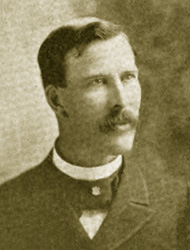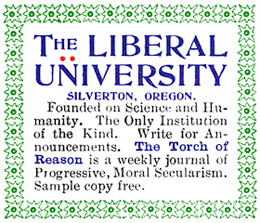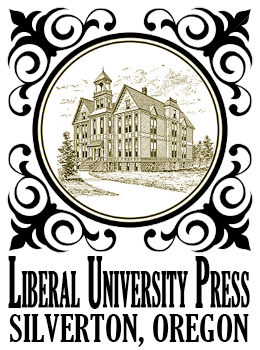By Dr. P.A. Zaring — March, 1901
 Tampico, Indiana: We are sometimes astonished at controversies between persons of the same belief, over the shades of meaning of synonymous terms. There are persons who investigate principles with all possible care, and delve deep into the most profound thoughts, without paying due attention to the particular words which express these thoughts exactly. Words which have similar though slightly different meanings, may be used during a whole life time without being carefully studied. The thoughts which such words express might be sifted over and over, and every day words used to express these thoughts, while these familiar words may express thoughts slightly different to other people.
Tampico, Indiana: We are sometimes astonished at controversies between persons of the same belief, over the shades of meaning of synonymous terms. There are persons who investigate principles with all possible care, and delve deep into the most profound thoughts, without paying due attention to the particular words which express these thoughts exactly. Words which have similar though slightly different meanings, may be used during a whole life time without being carefully studied. The thoughts which such words express might be sifted over and over, and every day words used to express these thoughts, while these familiar words may express thoughts slightly different to other people.
The study of words is the one study which comprehends all other studies. I believe that every thought that has ever been produced in the human mind has been expressed by some word or words, and if it were possible for someone mind to master all of the words of all languages, then that one mind would have digested all of the thoughts of all people. With every word comes a thought, and to comprehend all of the shades of meaning of any word it is necessary to investigate all of the phases of the thought which that word expresses. And the person who has learned the most words has had the most thoughts.
We think in words. We cannot think without words. From the moment we wake in the morning till we go to sleep at night we are constantly thinking, but in our minds every thought is expressed in words. It is absurd to say, “I know, but I cannot tell it.” or: “I can think as well as others, but I haven’t the language to express my thoughts.” Yet we often hear such sayings. It is not possible to have thoughts without language, for we think in words. A deaf mute has some ideas which may be called thoughts, which pass through his mind in pictures. Brutes think of the objects themselves, and are supposed to retain in their memories images of objects. But man thinks in words.
Then the difference between the intelligence of man and that of the beast is language. The difference between the savage and the civilized man is the difference of their languages. The difference between the illiterate and the educated man is the difference of their languages. Then the study of all studies is language. And the pretty part of this study is synonyms. I say the pretty part. I might say the beautiful part. For it is the mastery of synonyms that makes the orator and the poet.
Often a seeming difference of opinion will arise between persons of similar intelligence, integrity, and opportunities, over the meaning of a familiar word, when if it were referred to an authorized standard, there could be no possible dispute. I believe that such a controversy is up now between Mr. Holyoake and Mrs. Garrison. I cannot see any material difference between the beliefs of those two. The dispute seems to be over the meaning of the word “Atheism.”
Webster defines Atheism as “a disbelief or denial of the existence of a God, or Supreme Being.” Now, what is a God, or Supreme Being? What has always been the meaning of such terms? What do you mean by it? When you pronounce the word God there is in your mind the image of a human being of the masculine gender, of about a certain stature, complexion, etc. And such have always been the gods of those who believed in them. Such were Osiris, Jove, Buddha, Jehovah and all others. To such a one the orthodox attribute the creation of the universe.
Do you believe that such a Being exists in reality, or that he exists only in the imagination? If you do not believe that such a Being, such a personality, exists, then every Christian, every Buddhist, every Muslim, every Jew, and, perhaps, every lexicographer, would call you Atheist. Usage determines the meaning of words. Lexicographers adopt meanings in general use. And while an individual may have the right to coin new words to suit his convenience, he cannot have a right to use old words with meanings contradictory to general usage and established authority. So, however much odium may have attached to the term Atheism in the past, I frankly say that I am an Atheist.
When a Pantheist professes to believe in God and then makes God synonymous with nature, I would call that dodging. For the two are not synonymous, and never were. Every Atheist recognizes nature as much as does the Pantheist or Deist. What, then, is the difference?
Those who doubt the existence of God are skeptics. Those who recognize that such a Being may exist, but cannot say with Job, “I know that my Redeemer liveth … and in my flesh shall I see God,” are Agnostics. But those who do not believe in the existence of God, according to the correct meaning of the term, are atheists. Thus far let us all agree. And thus far is far enough. Thus far the meaning of the word Atheism extends and no farther. The Atheist does not, and need not, undertake to explain how matter came into existence. It is the part of the Atheist to dethrone God; but when this is done the Atheist is under no obligation to install some other person or thing in his place.
But while we are under no obligation to do so, we feel inclined to, nevertheless. We substitute Evolution for the Creator, Law for the Supreme Ruler, human Reason for the Deliverer, but as to the First Cause we are, in reality, all Agnostic, and some of us are honest enough to confess it.
Webster defines Atheism and then quotes R. Hall as saying, “Atheism is a ferocious system, that leaves nothing above us to excite awe, nor around us to awaken tenderness.” The term Atheism, like the more common term Infidel, seems repugnant to many persons who would he equally loath to being called orthodox. Many Liberals regard Atheism as a dangerous system, because within itself it possesses no restraining influence. But persons who are sufficiently evolved to discard superstition entirely, seem to have little or no need of the restraining influences of religion. It is a fact that Infidels are the most moral people in the world. If there is nothing above us to excite awe, there is much to challenge the admiration, and that is better. And there is as much around the Atheist to awaken tenderness as there is around the Christian who endorses the brutalizing doctrine of infinite punishment, as the history of Christianity will attest.





